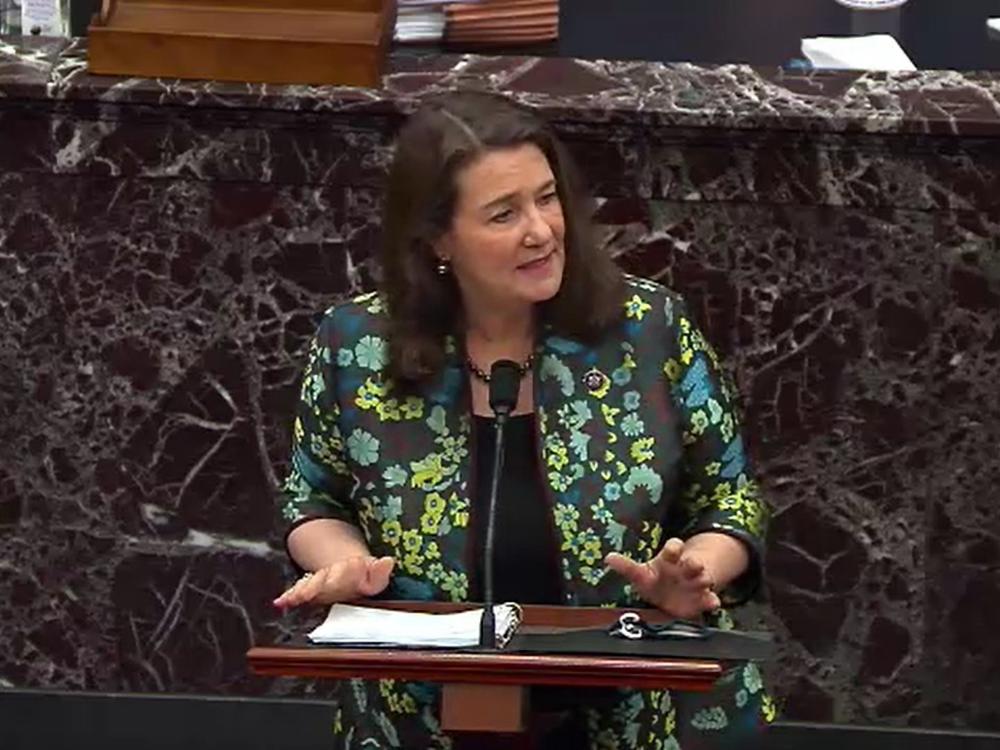Section Branding
Header Content
Rioters' Own Words Show Incitement By Trump, Impeachment Managers Argue
Primary Content
The impeachment trial of former President Donald Trump hinges on the question of whether he incited insurrectionists to storm the Capitol on Jan. 6.
To make their case, the House impeachment managers have argued: Just listen to the rioters.
"Their own statements before, during and after the attack make clear the attack was done for Donald Trump, at his instructions and to fulfill his wishes," said Rep. Diana DeGette, a Colorado Democrat, on Thursday.
Many of those statements appear in the criminal cases against the alleged rioters. NPR's Investigations team has been tracking those cases — more than 200 so far — and has created a searchable database with information about the known defendants and the charges they face. So far, NPR has found, at least 26 defendants have made specific and explicit statements that they stormed the Capitol because they believed Trump wanted them to.
For example, members of the far-right gang the Proud Boys, who allegedly joined the riot, cited Trump's language during a 2020 presidential debate in which the then-president said the group should "stand back and stand by."
Daniel Goodwyn, an alleged Proud Boy facing charges of violent entry and disorderly conduct on Capitol grounds, posted an image featuring Trump's quote on Twitter on Nov. 7, 2020, and added, "Await orders from our Commander in Chief."
On Thursday, as the impeachment trial continued, federal prosecutors brought to light new information in the conspiracy cases against alleged members of the Oath Keepers, a far-right extremist group.
"It is CRITICAL that all patriots who can be in DC get to DC to stand tall in support of President Trump's fight to defeat the enemies foreign and domestic," the leader of the Oath Keepers allegedly said two days before the insurrection.
Jessica Marie Watkins, a U.S. Army veteran and alleged member of the Oath Keepers, "indicated that she was awaiting direction from President Trump," prosecutors said Thursday.
Watkins allegedly joined the riot along with Thomas Caldwell, a Navy veteran and also an alleged Oath Keeper. Prosecutors revealed on Thursday that a search of Caldwell's residence in Virginia had turned up a document labeled "Death List." "Handwritten on the document was the name of an election official from another state," the prosecutors said. (That election official is not identified in the court papers.)
Many of the defendants' claims that Trump inspired them, however, have come not from search warrants but, rather, from public posts on social media. In many cases, defendants livestreamed footage or took selfies inside the Capitol, providing extensive evidence that prosecutors are now using against them.
House impeachment managers argued that the Capitol rioters were especially brazen because they thought they were acting at the request of the president.
"This was not a hidden crime," DeGette said. "The president told them to be there, and so they actually believed they would face no punishment."
Trump's attorneys have argued that the Capitol insurrectionists acted completely of their own accord and that the former president did not directly call for violence and lawlessness. Their presentation to the U.S. Senate is expected to wrap up Friday, following the arguments from the House impeachment managers.
NPR's Barbara Sprunt contributed to this report.
Copyright 2021 NPR. To see more, visit https://www.npr.org.

